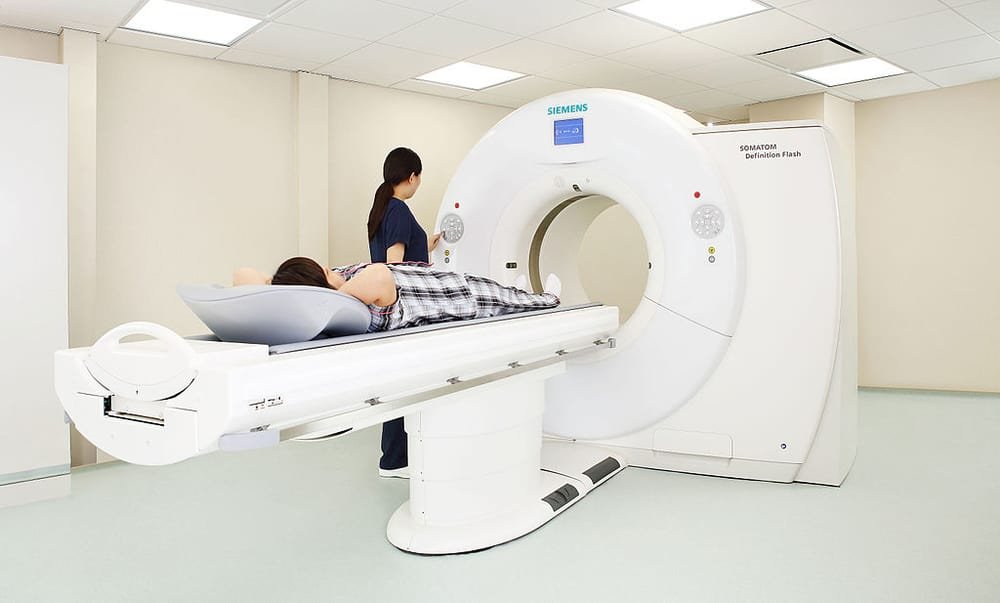CT Scan
What should I know about CT Scan?
Appeared for almost 40 years, computed tomography, commonly called CT Scan, is an alternative to conventional imaging techniques for the management of pathologies requiring a more precise diagnosis. Quick and easy to use, it is widely practiced today. But what does a CT Scan consist of? What are the possible complications? This mini-guide will provide you with all the useful information about this exam.
The CT Scan: principle and operation
Computed tomography is a medical imaging technique that allows targeted thin section images of the body to be produced, by combining the use of X-rays with a computerized system. The CT Scan is thus made up of a ring incorporating an X-ray emitting tube and digital sensors which scan the area to be studied by performing rotations.
This technique consists of measuring the absorption of X-rays by the tissues and digitizing the information thus collected in order to reconstruct 2D or 3D images of the various anatomical structures. To improve tissue visibility, an iodine-based contrast product is often used, which will be introduced orally or intravenously.
Read also: Difference Between CT Scan and MRI? (Medical Imaging)
Why do you need a CT Scan?
The advantage of CT scan exploration is that it gives very precise information on the areas studied. It is particularly considered for looking for lesions that are not visible on ultrasound or on conventional x-rays.
Used for the management of various pathologies, this examination applies to the exploration of the brain, the abdomen, the thoracic cage or even the bones in order to detect various anomalies: hemorrhage, tumors, cysts, infections, ganglia…
A CT scan can also be performed during the monitoring of certain treatments, in particular in oncology, or to guide punctures in deep organs, or to define the path of a blood vessel or the location of an organ in relation to a other.
How to prepare?
Some exams may require you to be fasting. If this is the case, you should stop taking solid foods 5 hours before the session. You can, however, drink water, unless otherwise indicated. Likewise, if you are undergoing treatment, you should take your medication unless otherwise specified. Moreover, if you have an allergic ground, you will be offered premedication to limit the risks of intolerance to the contrast agent.
Read also: MRI (Magnetic Resonance Imaging)
How is the exam going? (the process)
Before the session, you will be asked to remove all metal items. If the examination requires an injection of contrast product, the radiologist will install a venous line (a needle connected to a catheter) over the fold of the elbow.
You will then be lying on a movable table that moves around the ring during the exam. You are all alone in the room but you can communicate by intercom with the medical team following the examination behind a glass, ready to intervene if necessary.
The session itself lasts an average of 10 to 30 minutes. Image acquisition is very fast. It lasts about 30 seconds during which you must stay still and not breathe to prevent the images from being blurry. Your cooperation is very important.
Is having a CT scan painful?
The passage under CT Scan is painless. When injecting the contrast medium, you will feel a sensation of heat which dissipates quickly. Otherwise, the examination being a little scary, soothing premedication is sometimes offered for the children.
What are the possible risks of the CT Scan?
The contrast medium: The complications associated with the injection of the contrast medium are exceptional. Although this happens very rarely, the product may leak into nearby tissues causing a hematoma to form and may require local treatment. In addition, it is necessary to take certain precautions for patients with renal, diabetic, allergic or cardiac history.
X-rays: Exposure to X-rays should be limited as much as possible in the event of pregnancy in order to avoid irradiation of the fetus. In principle, exploration of the pelvis should therefore be avoided. If absolutely necessary, certain precautions should be taken. If you are pregnant or in doubt, you should tell the medical team when you make your appointment.
Price
In the US, prices can range from US $300 to $6,750. It depends on the specific type of exam and the area being imaged.
One factor that can greatly affect the cost of your CT scan is whether you have it performed in an inpatient facility, like a hospital, or an outpatient surgery center.
Information: Cleverly Smart is not a substitute for a doctor. Always consult a doctor to treat your health condition.
Sources: PinterPandai, National Institutes of Health, Mayo Clinic, Radiological Society of North America, Inc. (RSNA)
Photo credit: Peggy.poon.ths / Wikimedia Commons (CC BY-SA 4.0)



